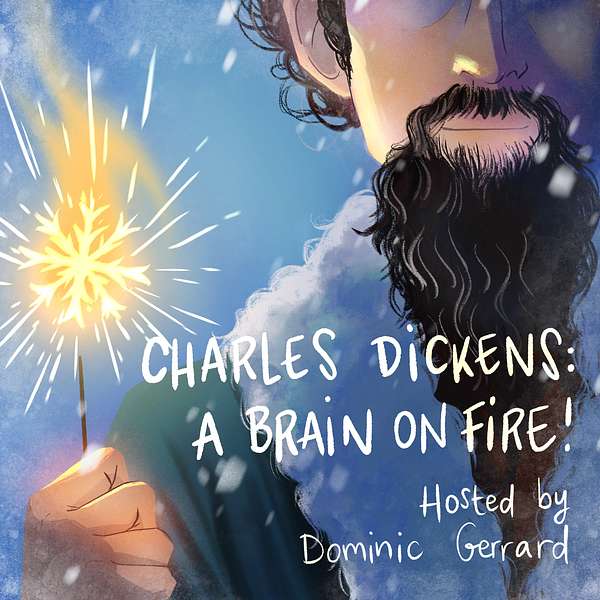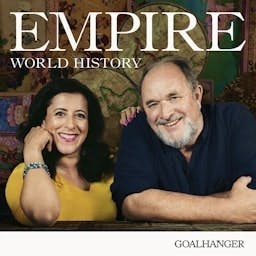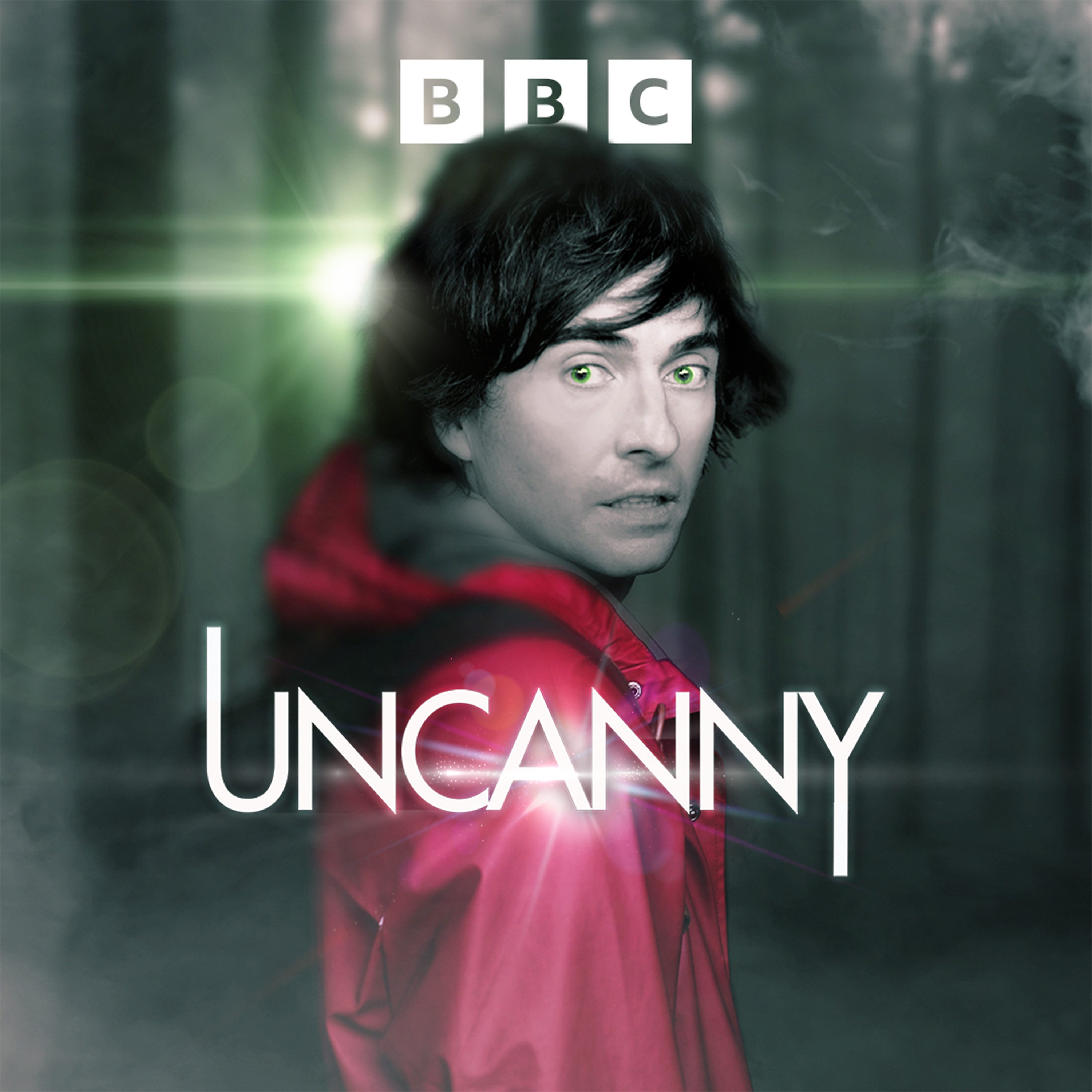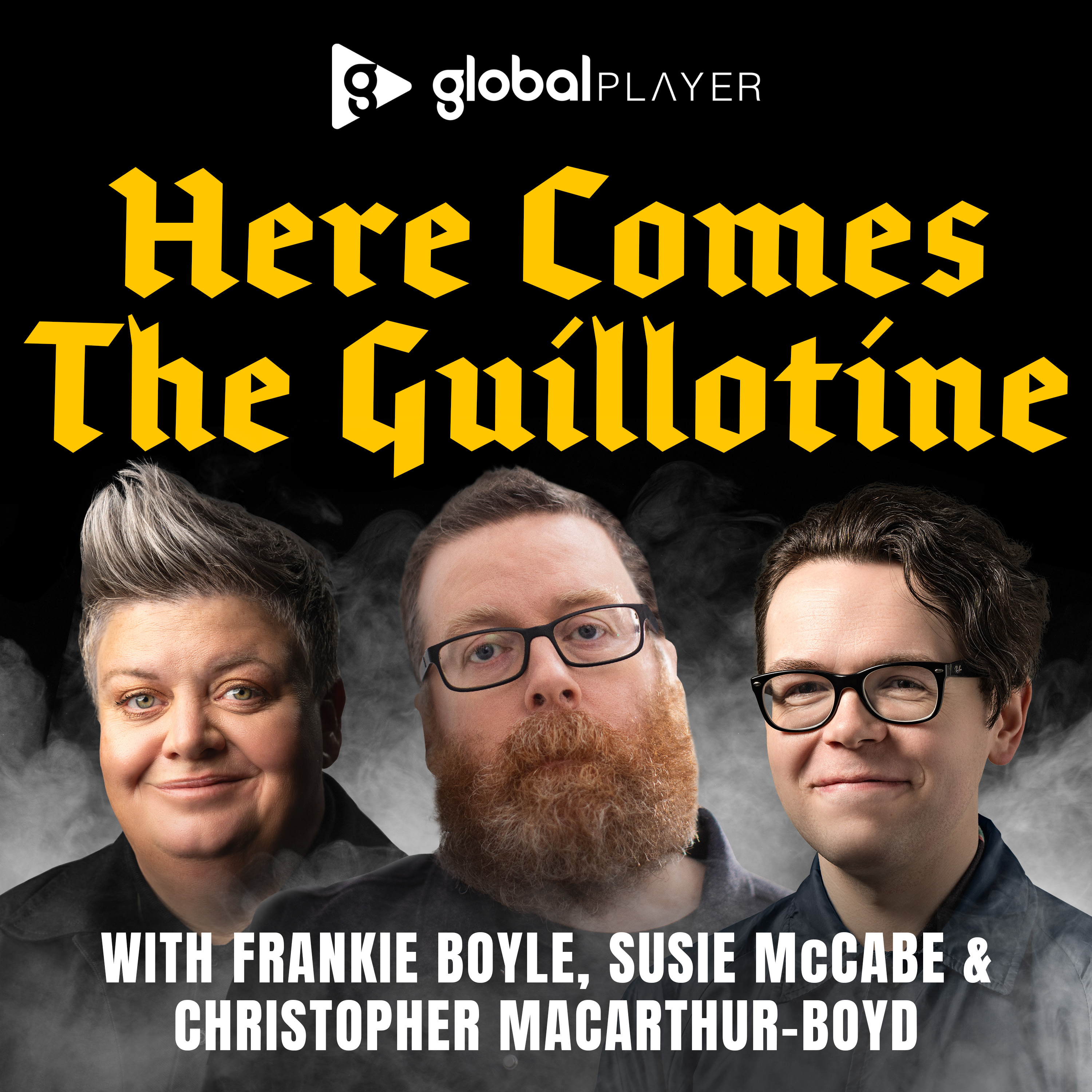
Charles Dickens: A Brain on Fire! 🔥
Guests include: Stephen Fry, Miriam Margolyes, Armando Iannucci, Alice Loxton, Robert Douglas-Fairhurst, Lucinda Hawksley, John Mullan, Pen Vogler, Andrew Davies, Rosie Holt, Bernard Cornwell .... and many more academics, writers, actors, directors and descendants of the great man himself!
Along side these interviews there are special Dickens readings from across his works ...
Thank you for listening 🔥
Charles Dickens: A Brain on Fire! 🔥
Copperfield, Chuzzlewit ... Partridge? : with Armando Iannucci
Use Left/Right to seek, Home/End to jump to start or end. Hold shift to jump forward or backward.
Welcome to this special one-on-one chat with Armando Iannucci - one of the leading comedy writers and political satirists of our time - where we delve into his literary passions and influences.
This lively conversation peels back the layers of Armando's lifelong love of Charles Dickens - Martin Chuzzlewit in particular -and his interest in John Milton's masterpiece Paradise Lost and how these literary giants have left an indelible mark on his work. How he would later go on to write, produce and direct his own adaptation of David Copperfield, and whether he agrees that the character of Alan Partridge belongs in Dickens' canon of comic creations!
Plus his current work adapting his mock-verse poem Pandemonium for London's West End.
With readings from the wonderful Rebecca Tanwen.
If you'd like to make a donation to support the costs of producing this series you can buy 'coffees' right here https://www.buymeacoffee.com/dominicgerrard
Thank you so much!
Host: Dominic Gerrard
Series Artwork: Léna Gibert
Original Music: Dominic Gerrard
Thank you for listening!
Hi everyone. I am thrilled to welcome today's guest, armando Iannucci, who is one of the leading comedy writers and political satirists of our time both sides of the Atlantic. Creator of award-winning shows such as the Thick of it Veep, for which he won two Emmys, and Avenue Five. As a filmmaker, he directed, wrote and produced the Death of Stalin and the personal history of David Copperfield, with laser-like focus. In all of his work, armando reveals the awkwardness and absurdities of human behaviour, from trying to greet people with fist bumps to the far more serious political misdemeanours of our elected representatives. During the pandemic, he sat down to write his mock epic poem Pandemonium, which heaped scorn and derision on Boris Johnson's personal history of mishandling the Covid crisis here in the UK. He is now expanding this work into a full-stage adaptation opening in London's West End this year and with new verses, to include Liz Truss's 30 Seconds as Prime Minister.
Dominic Gerrard:In a far-reaching chat today we talk about Armando's love of Dickens, but also John Milton, plus ideas of how to portray comic and serious characters in ways that are truthful and why. I certainly believe that his co-creation of Alan Gordon Partridge is absolutely a Dickensian character. Reading excerpts from Dickens and John Milton is the brilliant actress Rebecca Tenwin Armando. Welcome to Charles Dickens' A Brain on Fire. It's so great to have you here. Nice to be here. So you're very, very well known for your career in satire and comedy and keeping your finger on the pulse in terms of politics both sides of the Atlantic. But when did your interest in Dickens first manifest itself?
Armando Iannucci:We had, I remember, at school, had a rather slightly old-fashioned English teacher who was a big fan of fat Victorian novels, which is all well and good. A lot of the fat Victorian novels are very good and I think I was introduced to Dickens via one of his slimmer novels, which was Great Expectations, which I thought, you know, as anyone who's very great expectation thinks it's, you know, wonderful. And I thought I'd go off and do a bit of Dickens-ing around myself and the local library, the Hillhead Public Library, that had just opened up two blocks down from me in Byers Road, glasgow, meant I could just borrow any book I liked and I thought I'm going to explore this Dickens. And I picked up Old Curiosity Shop and it was very funny I mean just really funny and no one had told me that Dickens was funny.
Armando Iannucci:Everyone tells you that Dickens is a great moraliser and a, you know, a social comedy and satire and whatever, but not actually funny. And I remember there was a character in Old Curiosity Shop whose name wouldn't really survive now in any adaptation Because it's called Dick Swiverler. But he was always in debt and he carried this book around with him which was a map of London, and every day he would just cross the streets on the map that he can no longer go down because he owes people money there, and it felt like a kind of comedy routine really, I mean, but also desperately sad, you know. But he's able to make a kind of comic construction out of it and that really appealed to me.
Rebecca Tanwen:I enter in this little book the names of the streets. I can't go down while the shops are open. This dinner today closes long acre. I brought a pair of boots in Great Queen Street last week and made that a no thoroughfare too. There's only one avenue to the Strand left open. Now the roads are closing so fast in every direction.
Armando Iannucci:Then, weirdly, I moved on to a novel that very few people would. I talk to them about Dickens, seems not much about Martin Chuselwit, which is hilarious, yeah, absolutely. You know every scene is like a comic classic really. And obviously then, as Dickens work got more mature and you know he recognized his position of influence, he was able to marry that ability to entertain and to be popular and, you know, to speak to the masses but at the same time, you know, using that public platform to, you know, expose and explore really difficult social themes and I've always admired that about his.
Armando Iannucci:You know he could have taken it easy. He could have, you know, off his success. He could have played the same thing again and again and again, Done all of a twist to and which was happening in the theaters of the theaters. There was no copyright law on those days, so the theaters were just putting on boldlerized and made up versions of his novels. You know he could have done that, but he just decided to keep moving on and keep exploring and become more adventurous and daring. Blickhouse is one of the most innovative, structurally innovative and experimental novels ever written, because it's like in two different, there's two different narrative voices that alternate the chapters. One is in the first person, the other's third person, One is in the present tense, One is in the past tense. What made him think that, you know? And yet it kind of worked.
Dominic Gerrard:And to be writing as a woman as well is extraordinary.
Armando Iannucci:Yes, exactly Exactly, and he started off writing these things as periodically you know, as weekly or as monthly installments, not really knowing where they were going. So you know Pickwick Papers, famously, he was just hired to write words to go with pictures and selling point with the illustrations really. But his words to go with the illustrations were so entertaining that it really took off and he so he became the most famous writer in Britain at the age of whatever, 21, 22. And so I think he never set out to be a novelist. I'm not even sure he set out to be a writer. I think he set out to be some kind of observer or the world.
Armando Iannucci:You know he started off as a parliamentary sketch writer, I suppose, and then, along with Pickwick Papers, so he didn't have a plan, he didn't have, you know, a novelist's agenda, so I think he was working it out as he went along, as he went on to do all of a twist and, nicholas Nickleby, he could see the audience that he was connecting with and it was a mass audience. I mean, I mentioned Pickwick Papers, the famously people were queuing up at the docks in America for the final installment of the Ocuriosity Shop because they wanted to know whether little now lived or died. So it was a real sort of season finale of the Ocuriosity Shop was arriving on a ship that taken six weeks to get over so he could see this mass appeal. And then as he started exploring where else he could take the novel and how he could expand its scope, I think he then started to challenge himself, almost like take himself out of his comfort zone in his later novels.
Dominic Gerrard:I'm so struck and I agree totally with what you were saying about that surprise at finding how funny Dickens is. But then the surprise of finding how serious he can be in a book with characters called Chuzzlewit or Swedelepipe and these bizarre character names. And yet as you read them, they settle. I know that Martin Chuzzlewit is a big favorite of yours, but I remember in my early 20s seeing that title in a bookshop and thinking I really don't want to read that one. It sounds a bit rubbish Just looking at the title, and then later on finding out I was completely wrong and that Dickens can hold all these opposite things together in the same narrative.
Armando Iannucci:Yes, you get this sort of impression by with those sort of middle books of his, that he has a kind of a plan, there's a sense of structure, but at the same time it's still spontaneous because he is still writing it in regular installments. Martin Chuzzlewit the sales of Martin Chuzzlewit were slumping so he decided to send half his characters off to America for no reason and there's 200 pages of a very, very funny satire on America's capitalist obsession with wealth and property and underneath the guise of these kind of values, about freedom and liberty and so on. So it's still kind of messy and that's why I like about him. Actually, I'm sure if he did these drafts of these books and then looked at them two or three years later, he would have gone back and changed the names and done that. But he couldn't because they're already out because of this monthly and then weekly kind of publication model that he had. So he couldn't really change them.
Armando Iannucci:But I kind of like that because it allows us the messiness and the sprawl, the fact that he's really looking at life and then turning it into writing and you shouldn't be conscious of it having a shape and a structure. Really you should be feeling that much more organically and instinctively rather than hearing the novelist or the writer tell you this will parallel that in 200 pages and this theme will emerge slightly differently here. It's not about that at all. I think he's trying to get under the skin of the people, which is why they seem yes, they've got funny names and yet they seem so lifelike, they seem so fully formed.
Dominic Gerrard:Yes. Well, this leads me straight on to one of your creations, Alan Partridge Right, and I see him. Sorry to throw that straight at you, but no, no, no, that's all right. I see him entirely as a Dickensian character, but hearing what you've said about him in the past, it's really interesting to see you trying to work out what is plausible and what is over the top for him.
Armando Iannucci:Yeah, I mean flatter that you equate part than Dickens Canaveral. There is something about that that we didn't have a plan for Alan. He emerged spontaneously in that I just asked Steve Coogan to be our sports reporter on On they Are, which is a fake news program, and he came up with his voice, which was a kind of amalgam of lots of sports reporters but no one in particular, and it felt so real that we were instantly saying, oh, he lives in Norwich and we were already coming up with a biography for Alan. And also we didn't plan that character as a project that we would then do for four series of something a sketch show or chat show for four years. And it's been popping up and up and out over the last 30 years in different guys' because he sort of feels like there is a thread of life in him. And whenever Steve and I met up when we weren't doing Alan Partridge, we would get into a conversation about what do you think Alan's up to now and we would speculate. So there was this running life going on at the back of our heads. That was Alan. That seemed to have a kind of momentum of its own that we occasionally dipped into and Dickens talked about, I mean his daughter, I think spoke about when he was writing.
Armando Iannucci:You could hear him writing because he would act out some of the characters in the mirror. He would look in the mirror and be the characters and that was how he brought them to life. Yeah, he did talk about whenever he ended a novel. It felt really sad to him because he felt he was saying goodbye to these people who had become his friends in his head, you know, and it kind of feels then that each Dickens novel is part of his output, is almost like a continuous novel. I suppose the Marvel Cinematic Universe is the model that comes. You know, I think there is a Dickens novelistic universe, that where characters from the different novels must live near each other and could occasionally bump into each other, I'm sure.
Dominic Gerrard:Yes, and it's interesting what you're saying about Dickens practicing in the mirror and improvising his characters aloud, which I think is what you did as a group to create. Alan Partridge, yes as well. Yeah, just on Alan, very quickly, though you disagree slightly with, I think, with Patrick Marber about the first series and the second series, because Patrick Marber felt that the second series would be less realistic or naturalistic if it was a kind of over the shoulder in the hotel.
Armando Iannucci:Yeah, I think Patrick was just nervous that I mean it was also. Patrick had just written I think it was just written deal as choice and it was a great success in the national. So he couldn't, he had to bow out gracefully from writing the series. He was nervous. The three of us had decided we did want to do a kind of sitcom with Alan, but how do we keep it real? And Patrick was nervous that it might feel like a sitcom. But that just, I think, encouraged us to try and think OK, how do we avoid that? And watching sitcoms?
Armando Iannucci:At the time it was a lot of loud acting because, you know, very theatrical, it was people on a stage projecting out to the audience in the studio. And so what I did was I we built the sets within these crates of four walls that would force the actors to look at each other instead of to the audience. But the audience would be in the studio watching them on screens and so the actors could still hear the audience laugh and be able to take their timing from the laughter. But it would feel real and it wouldn't feel pressurized into speaking loudly outward but quietly to each other. And then, as the evening went on, the recording went on. We would take the front wall off so that the audience could actually see into the set and that would give it that air of feeling like it was filmed on location, but actually the sense of an audience being there to respond to it.
Armando Iannucci:Some people thought that it was filmed in a hotel, but it was not. It was filmed at TV Centre. Dennis Begrut, our designer, did a very, very good life like hotel for which he was not rewarded because everyone thought he just moved us to a hotel. We see a bloody hard work on his part, then.
Dominic Gerrard:Yes, it worked so hard to make his work invisible.
Armando Iannucci:Exactly, you know. So he should consider that an honour.
Dominic Gerrard:Yes, that's interesting, and so reading Dickens as a young boy. Did that do anything to garner your interest in politics and satire?
Armando Iannucci:It always was interest in politics. I think more in the kind of the drama of it, the procedure, the grandeur of it really, and then over the years I've become more interested in how politics doesn't work and why it isn't working and the tricks that politicians use to get you know, which takes down to language, and in fact you realise that politicians are doing a performance anyway. But it was interesting. Dickens, as I said, he started off as a parliamentary sketch writer, so he was there at the start. Really that's his first writing task, really, to write not just summaries but funny and amusing takes on what had been happening that day. And I thought it reached the high, I think, for me, in Little Doric, where he invents Circumlocution office, which is this fictional government ministry where, just you know, good ideas go to die really and nothing gets done. And I saw it as a precursor to, you know, big Brother in 1984 and yes, minister, and Sir Humphrey and yes, minister, brazil. Or, you know, modern times, and even the Great Dictator, the Charlie Chaplin-esque take on the madness, the Kafkaesque nightmare of institutions and the little person, the little guy being caught up in the middle.
Armando Iannucci:I've always seen Dickens and Charlie Chaplin having a kind of similarity because both of them obviously both of them were born in poor circumstances in London. Both of them became the most famous comic writer or performer in the world at about the age of 21 and so on. Both of them were known for doing everything themselves. You know, dickens famously, was really in there, and not just in the book, in the writing, but wanted to know how it was, what the paper was going to be like. He was a hands-on, he ran a newspaper at the same time at various occasions and really involved doing everything, and both of them were there really inventing the rules of their medium for how comedy and satire should be done and setting those rules that you know have been maintained to this day. So I think there's a big similarity between the two of them.
Dominic Gerrard:Yes, and you mentioned yes Minister and I absolutely love that programme and its natural air. And successor is your show the Thick of it. But I've been rewatching yes Minister recently and it's wonderful. But I wondered if you felt that it might be a little bit too cosy or cuddly. You know the bad behaviour or the quangos and all the corruption behind the scenes, the massaging of the truth and figures. It's all kind of smoothed off and as a viewer you don't get as angry about it all as maybe you should.
Armando Iannucci:Interesting. I was doing a documentary about yes Minister, which meant going back and watching every episode, and I thought they all stood up, really, in terms of the themes and the topic. It was all about Europe, it was about terrorism, it was about cuts, it was about austerity, it was about you know, it was the same old, same old, and beautifully done, beautifully performed, and at the time we had no recordings of Parliament. We weren't allowed to. They started by putting microphones so we could listen to Parliament on the radio. We couldn't really get pictures of Parliament until after yes Minister started, so it was almost like this is our way of seeing into how white-hole works. I felt, though, that it might feel cosy now.
Armando Iannucci:I think at the time it felt quite radical, but it seemed to blame the civil service for ills, and my sense, when I was watching it and when we did the Thick of it which would be about 2005, 2007, something like that was that that relationship had changed, that the civil service weren't really the powerhouse behind things, they'd been sidelined, and it was the government bringing in their own alternative civil servants, which were the aides and the advisors, and the spads, the special advisors, or aged about 12, and their coltory of, and we've seen it in the last four or five years with every change of prime minister, unelected brings in her or his set of little helpers who then think they can now run the country any way they like, forgetting that they have to answer the parliament and they have to answer to us, sort of typified in its absolute worst by the crazy Liz Truss month.
Armando Iannucci:So I was picking up on the beginnings of that trend.
Armando Iannucci:I think Blair did it really, anastasia Campbell trying to control the grid, but before them Thatcher, I think, was the first to actually try and impose her will across Whitehall and, if required, bring in her own people to do it if the civil service didn't. So I wanted to capture that change and also just how much the media is driving events as well, in that I mean when we were doing the thick of it it was becoming 24 hour phones and everyone's a reporter now, because you've got a phone and a microphone, so you've got a camera and you can film it, so everyone is light on. And how difficult that makes things because you can't get everything right all the time. Somebody sticks their camera in front of you. You're bound to say something that 10 minutes later you think I don't know why I should have said that. I should have said something else. Don't know what I'm thinking, but by then it's too late, and at that crazy pressure that we now all put on politicians, I think that no wonder they kind of crash and burn much more frequently.
Dominic Gerrard:This is a natural step, then, towards your pandemonium.
Armando Iannucci:Right, yes, it's almost like this is whole planned, my whole.
Dominic Gerrard:By design.
Armando Iannucci:Right, yeah, pandemonium which I'm writing at the moment.
Dominic Gerrard:yes, I was going to say it's. My first question on that was are you writing to include Liz Truss and some of the things that happened since you first? Oh, yes.
Armando Iannucci:So this started as a poem and a more epic poem that I published during lockdown and it came out October 2020, november, so it was before mentions of parties and all that sort of thing, and before, obviously, boris hitting the buffers and then Liz Truss and then Rishi Shunek. So, and I'm doing it now as a play, more or less starting from scratch on it, because the bulk of it is new events, but starting with the pandemic and taking us to the present day, I'm doing it like an epic drama, really Like a Shakespeare history play or a Greek tragedy in 90 minutes.
Dominic Gerrard:And this, of course, this pulls out one of your other very key influences, John Milton. Where does John Milton then feature alongside Dickens and your influences? What is the connection?
Armando Iannucci:Well, I was rather taken by Paradise Lost because, again, it's the scale of it, it's the arrogance of this poet who says I'm going to tell you all about good and evil and right and wrong and free will and determinism and God and the devil, and then writing a very, perhaps against his own nature, very ambiguous novel length poem where Satan, rather like Darth Vader and all the other villains, is the most interesting thing. He gets the best speeches and I found that rather appealing. But it's all about temptation. It's all about are we free to choose or is everything by design? And was it saying to us that we actually find the devil much more interesting than God?
Armando Iannucci:Who's very boring in Paradise Lost very dull, I think Miles once and I remember coming across an academic article when he talked about God's smiling in heaven and called it as an example of Jehovahism. The writer was very pleased with himself. But that was the point where I thought I think I should move on and do comedy now. But I like that loftiness, the loftiness of the plan. I'm not going to tell you about little boring things, I'm going to tell you about the big things, right and wrong, and I could bore it in that setting, because he sees himself as a classically trained eye on history, churchill as his hero. The Greeks and the Romans are his inspiration. He wants to be in the big league, so I thought, okay, let's place him on that stage and see where we go.
Dominic Gerrard:Absolutely. And there's something in that character of Boris that reminds me of young Martin in Martin Chuzzlebit, that lazy, entitled position of oh, if I become a great architect one day.
Armando Iannucci:I'll look after you, it'll all happen, it'll all come my way.
Rebecca Tanwen:Yes, If I should turn out a great architect. Tom, said Martin one day, as he stood at a little distance from his drawing, and I did, with much complacency. I'll tell you what should be one of the things I'd built. I cried, tom, what? Why your fortune? No, said Tom Pinch, quite as much delighted as if the thing were done. Would you though? How kind of you to say so. Oh, I mean what I say, retorted Martin with a manner as free and easy in its condescension too, as if he were already first architect to all the crowned heads in Europe.
Dominic Gerrard:I absolutely loved your mock epic poem, pandemonium, and it inspired me to go back and read Milton's Paradise Lost. And something I found very powerful in moving in the Milton was the time as a reader you get to spend with Adam and Eve yes, much more than you do in the Bible. And there's that tragic moment where Eve has that dream, that premonition about being tempted by the serpent, and you think well, of course she's going to fail Her whole existence. She's been raised to be entirely innocent and unaware. How on earth is she going to stand against the forces of darkness?
Rebecca Tanwen:Me thought. Close at my ear, one called me forth to walk, with gentle voice I thought it thine. It said why sleeps thou Eve? Now is the pleasant time. I rose, as at thy call, but found thee.
Rebecca Tanwen:Not To find thee, I directed then my walk and on me thought alone, I passed through ways that brought me on a sudden to the tree of interdicted knowledge. Fair, it seemed Much fairer to my fancy than by day, and as I, wandering, looked beside it stood once shaped and winged, like one of those from heaven by us oft seen, but with venomous arm. He plucked, he tasted, he drew nigh and to me held, even to my mouth, of that same fruit held part which he had plucked. The pleasant, savoury smell, so quickened appetite that I me thought, could not but taste Forthwith. Up to the clouds with him I flew, and underneath beheld the earth outstretched, immense a prospect, wide and various, wondering at my flight and changed this high exultation. Suddenly my guide was gone and I, me thought, sunk down and fell asleep. But oh, how glad I waked to find this but a dream.
Armando Iannucci:And Milton is trying to make it so you can read it two ways simultaneously, which is, yes, of course she's going to do, because we all know that's the story, but at the same time although at any point she could, because she's free choose not to.
Rebecca Tanwen:Serpent. Thy overpraising leaves in doubt the virtue of that fruit.
Armando Iannucci:But of course Milton, like most people up till now, is a terrible misogynist. Blamed it all on her. Adam gets off really lightly, you know, he just wears a wine cloth. That's his punishment.
Rebecca Tanwen:Oh, why did God, creator, wise that people's highest heaven was spirit's masculine, create at last this novelty on earth, this fair defect of nature, and not fill the world at once with men as angels, without feminine?
Armando Iannucci:But what I like about it is the, and various people have written about it. How you know, milton is a bit like Adam and Eve and a bit like Satan, in that he's tempted. He's tempted to try and think he understands how God works and can put it in writing, which, of course, is the ultimate temptation, and he just about manages it, thus proving that we are better than God.
Dominic Gerrard:And when you sit down to write pandemonium and you're thinking of the epic poets of the past, when you're writing in verse form, do you make a conscious decision not to write in regular pentameters? For example, paradise lost is mostly pentameters, I think, isn't it?
Armando Iannucci:Yes, I'm trying to, and it's free verse, it's not. I'm not writing, I mean, two hours listening to rhyme after rhyme in a theater would drive everyone insane. So it's more. It's more heightened form that is sort of like heroic verse, but you know, gives me enough license to not have to stick to it rigidly, but enough to allow each of the characters not just to be themselves but to be able to voice and articulate grander ideas if they want to, or come up with visual images and comparisons and similes and so on if they want to, if it sells a story really. So it's the opposite of naturalistic dialogue, as it were. But hopefully and we've now done a couple of table reads just to kind of hear it back it should sound clear, as when you go to see any Shakespeare where they've really thought carefully about every line and how it should be delivered. So it's delivered like speech rather like something artificial.
Dominic Gerrard:Yeah, and you're working on pandemonium. You're expanding pandemonium for the stage. Just to wind back a few years, when you approached adapting David Copperfield for the screen with most Dickens adaptations it's usually a choice between the narrative as a you know, a voiceover in the film, or you have none of the narrative sections and it's just the dialogue. But you seem to find clever ways of introducing the narrative into the frame or into the dialogue. Did you have any ground rules for how you would do that?
Armando Iannucci:The first rule I said really to as we were writing in order to the actors and to the crew, was let's pretend that costume drama has never existed and therefore there are no set ways in which you do this. So it's as if we're doing it for the first time, because I wanted it to feel very real and direct and so on. But also, you know, david not copperfield does give us the way in, because it's a book about a writer. You know he. He grows up to be a writer. He spends the whole book Trying to work out who he is and he's called different names by different people dody, davey, daisy, yeah, topwood, and so on and wondering also whether he fits in, whether he's in the right state. You know his status and it's full of status, anxiety and imposter syndrome and all those other you know 21st century anxieties that we have. And then he works out all I'm a writer, all these people around me. I should stop worrying about what they think of me, and I'll write down, actually, what I think of them and and, and that's how I will define my bill really. So it was really about a Story that ends up becoming a book and that was the way into it, so that would allow us to start.
Armando Iannucci:It starts with there Pital as as David coming on stage, rather like Dickens when he used to tour giving performances, acting out scenes from his novels. Dev Patel comes on as David and starts with the opening lines of David Copperfield, but then the whole theater disappears and we follow his story but allows him, as an observer Of both himself and others around him, to comment at any time if he wants really, and then bring it all together at the end so that that and also yes, I've lost a dick and abletations I think throw away, like the language and the comedy, and just go for the story. I think the story is the least Interesting thing. I think. I think just use the story to to get to the next bit. He really wanted to to write really, yeah, so it was about trying to maintain that Relish for people and for the way they spoke and behaved and so on that David saw. So try to keep that in the in the film and so that we get excited by the way people talk and behave as well.
Dominic Gerrard:Yes, I'm picking up on you saying about how you wanted to pretend that there'd never been a period drama.
Armando Iannucci:Not to wander around slowly, sort of swinging your arms very slowly. You're on like your own parade and some Victorian, because people just just wonder along like you normally don't speak like this Sir. Speak like this sir, you know, because that's how people speak. So be aware that you're in the past because you're actually in your present day. You are modern as far as concerned.
Dominic Gerrard:That's so true because Dickens obviously parodies the pomposity of other characters, doesn't? He has?
Armando Iannucci:you know, you, honey, thunders and people like that that talk like that he makes yes, but fundamentally you know he's heroes and so on, our normal people, so they they should behave normally.
Dominic Gerrard:I thought dev Patel's casting was inspired and a moment that really, as a viewer, won me over to him was when he walks to find his aunt and he's starving, and he totally plays that for real. You know, he's a real person. There's no histrionics, there's nothing operatic about it, and then moments later he's sprinkled with vinegar and he can then deliver the comedy of that moment as well.
Armando Iannucci:No, he's great dev and he was the first and only person I could think of to play David's really. So I was Very nervous when I asked him if he'd said no, because I didn't really have a, I didn't really have a plan B. I always just imagine because some, you know, we've seen him grew up in Skinns and then obviously slumdog millionaire, yeah, and then I saw him in line where he was very strong. So I've seen him be comic and funny and gawking all that, and then in line he was very strong and charismatic and centered. That was the moment when I thought that's David Copper, because he has to be both David Copperfield, he has to be in control in the end of his own destiny.
Armando Iannucci:Well, at the same time, early on, being buffeted around and being a kind of participant in all these comic goings on and going back to Chaplin. Actually, when we did the, before you start a film you do a little lighting test and a costume test, which is basically you get the cast in and they're trying out the costumes first time. The director of photography and the lighting crew are trying out the look on camera for the first time and there is no sound. You know, we just we were just doing that. And it's when when dev walked on as David and did a bit of a Kind of walking stuff at that it was so funny because I thought it's Chaplin, it's Chaplin. And the fact that there was no sound. When I watched it back it was like a silent movie, just it was just incredible to see really, and there was someone who knew how to make his body Funny and then at the same time Serious and and centered and I thought Ben Wishaw's portrayal of you right.
Dominic Gerrard:He was excellent. He becomes quite a sympathetic character, doesn't he? You're almost on his side, which I think is more than what you get in the original novel. It's an interesting I mean in the novel.
Armando Iannucci:Actually, david Copperfield is quite horrible to you right at times and and we thought, maybe your I is almost like the same age as David and Basically they started in the same, roughly the same kind of status in life, and it was then what they chose to make of it that took them in their two different directions Really. So almost your rye could have been David, david could have been your rye If they'd done things slightly different, if you the one had done things slightly differently. So he sort as that really is, you know, without being explicit about it, but them seeing versions of themselves in each other. Yes, that's a warning really, but there are elements of that in in in the book. David is, you know, led on by Steve fourth and is horrible and snobbish and admits that he's become a snob and so on. And then it's funny, david Copperfield, all these themes are then Distilled in some of the later novels, dick instead.
Armando Iannucci:So that thing of snobbishness and class and so on, it goes into great expectations and and and and status and Poverty and wealth, and wealth and poverty goes into little Dorot, and it's funny how in David Copperfield all these themes are milling around in a kind of very raw and still slightly baggy kind of telling of a life, the whole growing up in the school in hard times with Graggrind and facts. All we want are facts. You know, it's almost like once you'd finished David Copperfield, a novel about a writer who writes a novel. Dickens has then worked out what he wants to do with the novel in the various baromenical things he then does with it in his latter career.
Dominic Gerrard:And in the cinematography, david's mother's face coming in out of focus reminded me of the moment where he talks about remembering her face, or trying to remember her face, and we see that, yes, the opening of David.
Armando Iannucci:Copperfield again is very kind of joicy and it's like all one syllable words and he's like a little baby trying to work out what words and smells and colors and shapes all mean. And you know he's trying to put meaning into his sensations around him.
Rebecca Tanwen:The first objects that assume a distinct presence before me as I look far back into the blank of my infancy are my mother, with her pretty hair and youthful shape, and pegaty with no shape at all and cheeks and arms so hard and red that I wonder the birds didn't peck her in preference to apples. I believe I can remember these two at a little distance apart, dwarfed to my sight by stooping down or kneeling on the floor and I going unsteadily from one to the other.
Armando Iannucci:It's like you know, his language is starting to form out of the clouds and and become much more stuck to become real. It's really fascinating. It's a great psychological novel in a way, really, because it is about this person who doesn't quite know where he stands. And you know, if I should become the hero of my own story, you know he doesn't know. He doesn't know where he sits in everything.
Dominic Gerrard:Amanda, thank you. This has been so brilliant, but before you go, I just wondered if you'd be happy to tell the listeners why you think they should read Martin Chuzzlewit. I completely agree, but for some reason I think it's one that's overlooked.
Armando Iannucci:Yes, it's a whole full of amazing set piece, comic and indeed dramatic moments. It's the sheer power of the, of invention there. There's Mrs Gamp who speaks in these malapropisms and who's a kind of precursor for characters. You see the two Ronnie's Ronnie Barker and Ory in Little Britain, and you know there's just getting words wrong and being quite confident about it. The trip to America is so full of. I think what peaches people off is the name and also the. You know the sheer length of it. So my advice is to buy it and just rip it into four 200 page notebooks.
Dominic Gerrard:So that it looks less daunting. Really, I agree, and I think possibly where he wronged the reader a little bit is that opening chapter, which is that parody history of the of the Chuzzlewit family with you don't tune into the irony there and enjoy that, that first chapter. I think it's quite hard for that second chapter and I was always in for this chat, I was trying to link you, milton and Dickens, into one place and I think the prose in that second chapter describing the weather and the wind gathering is pure.
Rebecca Tanwen:Milton A moment and its glory was no more. The sun went down beneath the long dark lines of hill and cloud which piled up in the west and airy city, wall heaped on wall and battlement on battlement, the light was all withdrawn. The shining church turned cold and dark, the stream forgot to smile, the birds were silent and the gloom of winter dwelt on everything. An evening wind up rose too, and the slighter branches cracked and rattled as they moved in skeleton dances to its moaning music.
Armando Iannucci:It's all a big elaborate lead up to a pratfall. Hexniff, who's very proud of just falling on his arse yes, it's wonderful, the scared leaves only flew faster.
Rebecca Tanwen:For all this, and a giddy chase it was. But the oddest feat they achieved was to take advantage of the sudden opening of Mr Pexniff's front door to dash wildly into his passage with the wind following close upon them, slammed the door against Mr Pexniff with such violence that in the twinkling of an eye he lay on his back at the bottom of the steps.
Dominic Gerrard:And Pexniff is terrible for all the best reasons. Yes, we really have. Thank you so much. Thanks, man. Goodbye now, bye-bye.
Podcasts we love
Check out these other fine podcasts recommended by us, not an algorithm.

A Jane Austen Year
Jane Austen's House
Dan Snow's History Hit
History Hit
The Rest Is History
Goalhanger
In Our Time
BBC Radio 4
The Rest Is Politics
Goalhanger
The Rest Is Politics: US
Goalhanger
The Rest Is Entertainment
Goalhanger
The Trawl
Jemma Forte & Marina Purkiss
Empire: World History
Goalhanger
The Rest Is Politics: Leading
Goalhanger
Page 94: The Private Eye Podcast
Page 94: The Private Eye Podcast
The Coming Storm
BBC Radio 4
Uncanny
BBC Radio 4
Here Comes The Guillotine
Global
The News Agents
Global
The News Agents - USA
Global
Daily Politics from the New Statesman
The New Statesman
The Spy Who
Audible

